With many COVID-19 restrictions still in place, community pantries have been filling a need that’s been widely felt across the country. Families struggling through the pandemic have been benefiting from the food and other essentials community pantries offer. Fortunately, nonhuman animals haven’t been forgotten in the effort.
Community “pawntries” created by well-meaning individuals and groups have been cropping up, providing people with enough supplies to take care of their animal companions. Puspins and aspins (domestic cats and dogs) can drop by and grab a bite to eat as well!
Here are just a few of the community pawntries that have made a world of difference over the past couple of months.
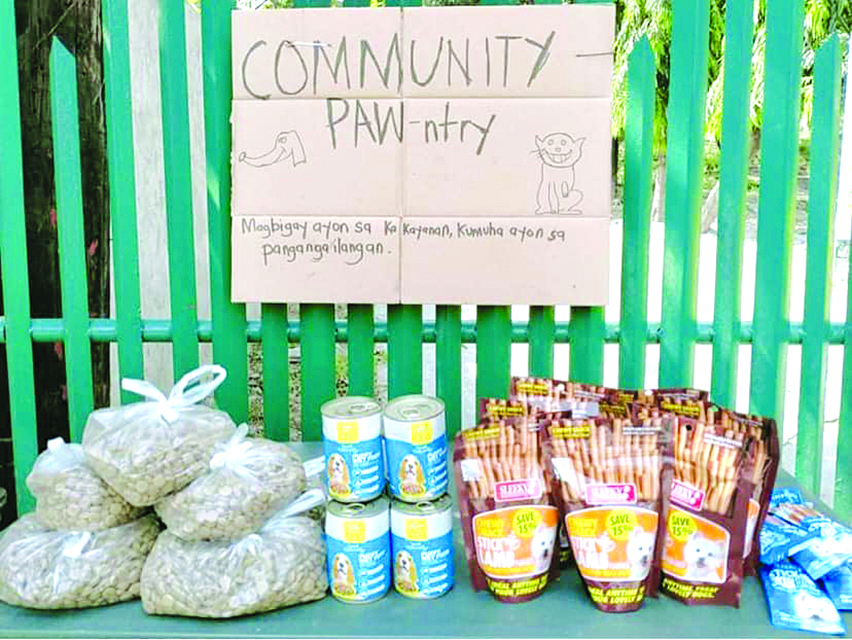
- PAWS, QUEZON CITY
On April 19, the Philippine Animal Welfare Society (PAWS) announced that they had set up their own community pantry for animals at the PAWS Animal Rehabilitation Center (PARC) in Loyola Heights, Quezon City. They called it a “Community PAW-ntry,” a table holding some of the non-profit organization’s extra supplies.
Though PAWS said it was running low on cat food, they did have bags and cans of dog food to spare. They wrote, “[W] e are just putting out whatever extra we have for pet owners in need.” Their community pawntry was meant to last only until their supplies ran out, but donations quickly poured in after they posted about their efforts on social media.
Animal lovers throughout the metro arrived to restock the community pawntry, but all the extra donations allowed PAWS to share these supplies with other community pantries in Quezon City and Mandaluyong City.
The PAWS Community PAW-ntry is open from 8 a.m. to 5 p.m. every day except Sundays and holidays. They continue to accept donations, either for the pawntry or for their own shelter animals.
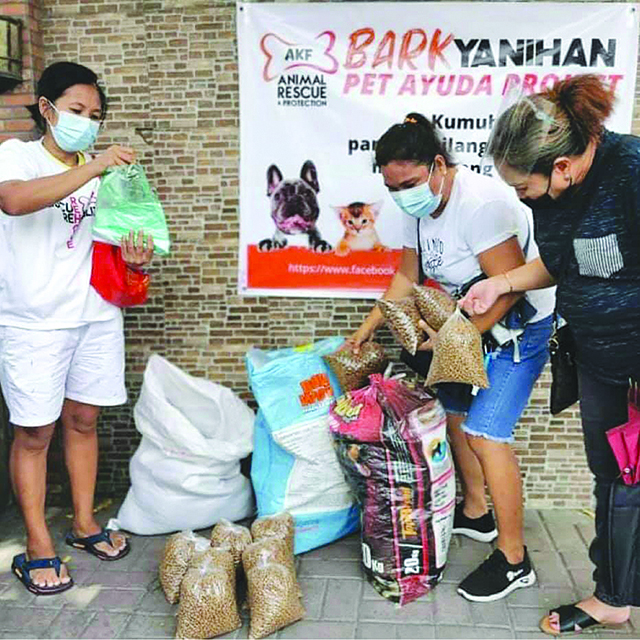
2. ANIMAL KINGDOM FOUNDATION
Acknowledging the pandemic’s effect on families’ abilities to care for their animal companions, non-profit animal welfare organization Animal Kingdom Foundation (AKF) also set up its own community pawntry initiative called the “BARKyanihan Project.”
“Hatid namin ang proyektong ito bilang tulong sa inyo,” they said in an April 19 Facebook post.
With the help of their volunteers, AKF was able to cater to different communities through their “Pet Ayuda Stations” located in Manila City, Makati City, Taguig City, Pasay City, Mandaluyong City, Quezon City, Laguna, Valenzuela, and Tarlac.
Like PAWS, AKF accepts cat and dog food donations for their pawntry.
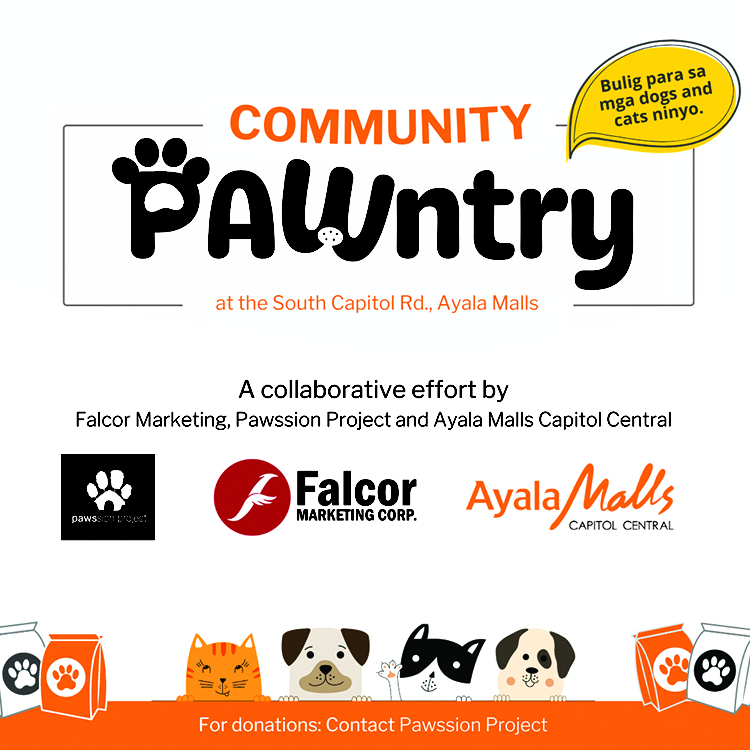
3. PAWSSION PROJECT, BACOLOD
A partnership between Falcor Marketing Corporation and PAWSsion Project Founder Malou Perez resulted in the launch of several community pawntries in Bacolod City.
The first in Falcor Marketing’s Narra Avenue Branch was announced on Facebook on April 21. They then set up two more in Robinson’s Place Bacolod and Ayala Malls Capitol Central in collaboration with Top Breed Dog Meal. The community pawntries offered packed dog and cat food as well as dishes with food for strays.
“No animal left behind,” Falcor Marketing Corporation said in an April 23 Facebook post.
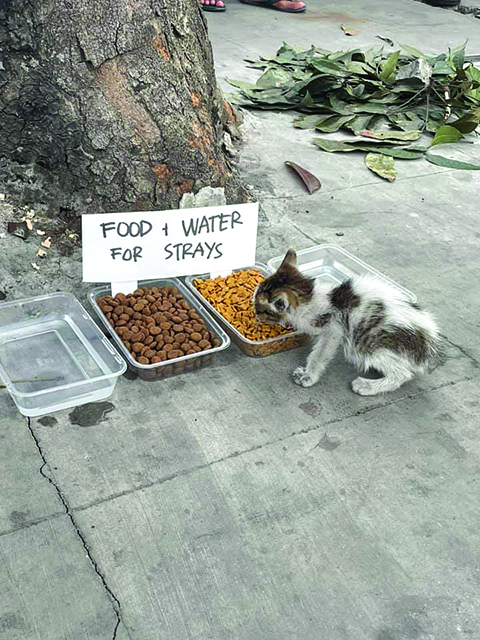
4. KALAYAAN-MAKATI
Organizations haven’t been the only ones setting up community pawntries. Several animal lovers from Makati City joined forces to set up their own on Kalayaan Avenue, in the same spot as the Kalayaan-Makati Community Pantry. That way, families could receive goods both for themselves and their animal companions.
Animal rights activist Avien Rosete posted about the group’s initiative on Facebook on April 20, reminding the public that nonhuman animals are still a part of the community. In an interview with The Philippine STAR, she explained, “Sila rin po ay may buhay at nakakaramdam.”
Their community pawntry offered sealed packs of cat and dog food, as well as open containers filled with food and water for strays. Though people were welcome to donate cat and dog food to the pawntry, Rosete encouraged them to donate to other organizations in need as well.

5. SAN FERNANDO CITY, LA UNION
On the same day Rosete announced the existence of the Kalayaan Avenue community pawntry, Arjay and Liezl Lagman launched their own in San Fernando City, La Union.
According to the Philippine Information Agency, their community pantry was the first to cater to animals in La Union. The Lagmans set up their pawntry right in front of their Samaya Pet and Poultry Supply shop. They hoped to provide aid to fur parents in the area who had been struggling to feed their animal companions amid the pandemic.
Arjay said, “Kahit ganitong bagay man lang po, may maitulong din kami sa ibang fur parents, hindi bilang negosyante kung hindi bilang pet lover din.”
Aside from free cat and dog food for animals, fur parents were also able to use the pawntry’s shampoo refilling station. The Lagmans’ pawntry seem to have been a big help to the community, considering the couple gave away around 160 kilograms of pet food on their very first day.
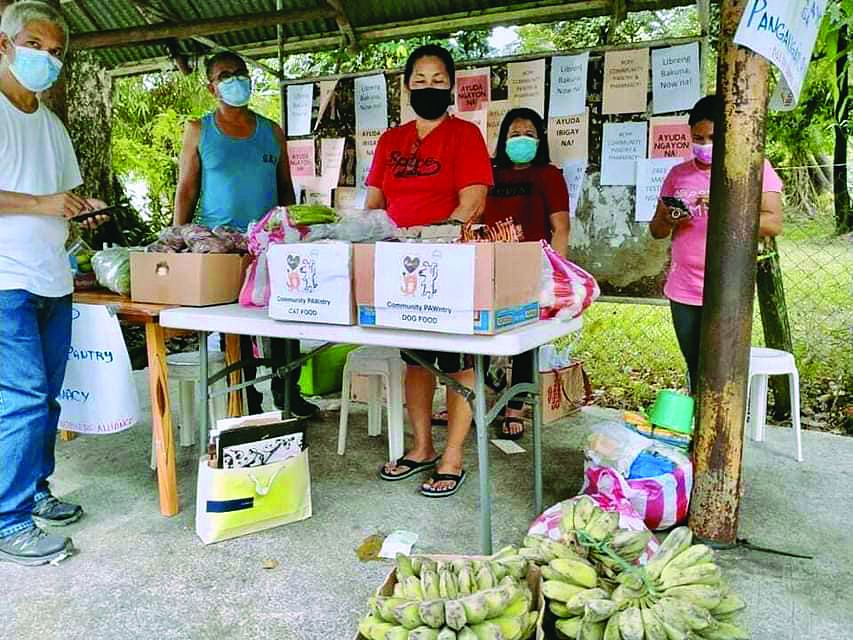
NOT THE END
Though community pawntries might not stay open forever, animal welfare organizations and animal rights activists know the movement shouldn’t end there. For instance, in her viral post, Rosete wrote that people should make sure to spay/neuter their fur babies and adopt and feed strays within their local government.
There are plenty of ways to care for and show kindness to our animal companions; this is true whether or not there is a pandemic.
HOW TO START YOUR OWNCOMMUNITY PAWNTRY
GATHER SUPPLIES
The point of community pantries and pawntries is to share goods with those in need. Gather food, water, or other supplies you or your community might be able to spare. Make sure to have some left out in dishes for strays.
LOOK FOR THE RIGHT SPACE
The community pawntry must be set up somewhere! This could be right in your garage or outside your office.
ENSURE SAFETY
All community pawntries, like any small gathering, must abide by the public health protocols in place in that area. Generally, everyone must wear face masks and face shields as well as practice social distancing.Zone
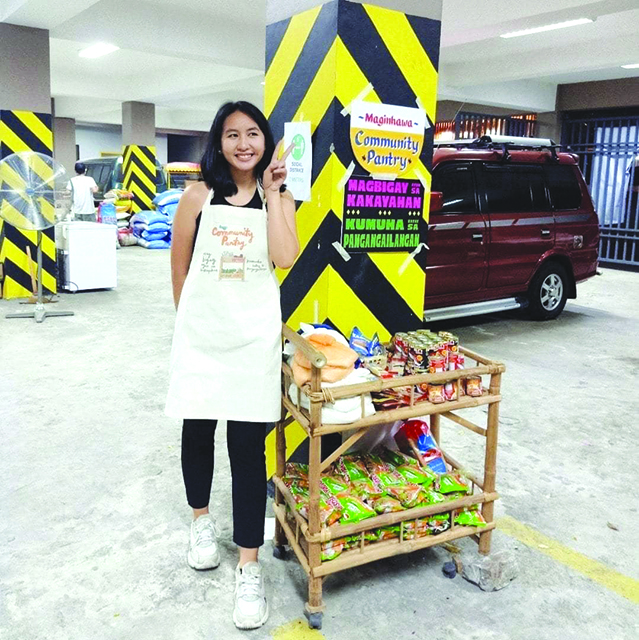
MAGINHAWA:AN INSPIRATION
Many of the community pawntries pointed to the Maginhawa Community Pantry as their main inspiration.
The Maginhawa Community Pantry came to life on April 14 after Ana Patricia Non set up a small bamboo cart in Quezon City containing just a few food items and essentials she planned to give away. After news of the pantry spread, others followed suit, setting up their own community pantries across the nation.






